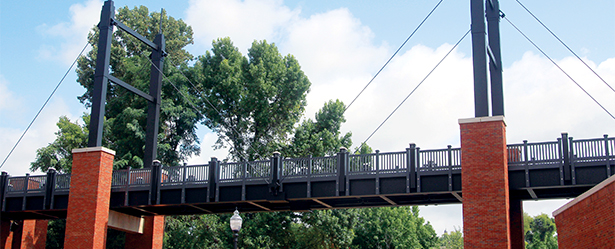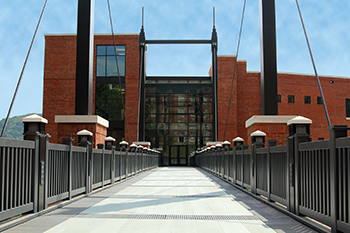Case Study: University of Tennessee’s First Composite Suspension Bridge

 A composites FRP (Fiber Reinforced Polymer) pedestrian suspension bridge was recently completed to join the new state-of-the-art, five-story, 110,000 square-foot, John D. Tickle Engineering Building to “The Hill” on Neyland Drive at the University of Tennessee, Knoxville. FRP was the logical material choice for this bridge because of its urban location adjacent to the Tennessee River. FRP offers excellent corrosion resistance in all water environments and its high strength-to-weight ratio properties allowed it to be transported and installed with relative ease without hindering already heavy traffic in that area of the city. The material also needed to be incredibly durable due to the bridge’s constant foot traffic as a main passage used by faculty, staff and students to access the building.
A composites FRP (Fiber Reinforced Polymer) pedestrian suspension bridge was recently completed to join the new state-of-the-art, five-story, 110,000 square-foot, John D. Tickle Engineering Building to “The Hill” on Neyland Drive at the University of Tennessee, Knoxville. FRP was the logical material choice for this bridge because of its urban location adjacent to the Tennessee River. FRP offers excellent corrosion resistance in all water environments and its high strength-to-weight ratio properties allowed it to be transported and installed with relative ease without hindering already heavy traffic in that area of the city. The material also needed to be incredibly durable due to the bridge’s constant foot traffic as a main passage used by faculty, staff and students to access the building.
| TECHNICAL DATA |
|---|
| Product: Composite Bridge Deck |
| Process: Pultrusion, Fiberglass Fabrication |
Materials:
|
Sizes: EXTREN® structural shapes:
36" EXTREN DWB® |
| For: John D. Tickle Engineering Building |
| User: University of Tennessee, Knoxville |
The deck portion of the bridge spans over 120 feet and consists of walkways utilizing DURAGRID® 2" T-1700 pultruded grating panels and Strongwell’s SAFPLANK® interlocking decking system. 2", 4" and 6" EXTREN® square tubes make up the bridge rail posts. The substructure is supported by 36" EXTREN DWB® (Double Web Beams).
The bridge was shipped after the materials were shop-fabricated by Strongwell to be installed on-site by Quality Machine and Welding Co. Inc., a structural steel fabricator and erector. Jeffrey Roth Jr., Vice-President at Quality Machine and Welding, noted this was the company’s first experience with FRP and Strongwell’s coordination and customer service were exemplary when minimal field modifications had to be made. Roth also mentioned FRP’s weight benefits, as only a lightweight crane was required to erect even the largest beams. The company was pleased with the project’s outcome and said it would welcome future FRP composite installations.